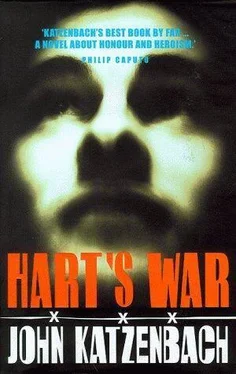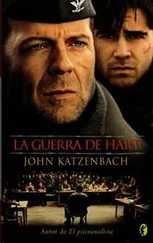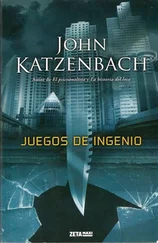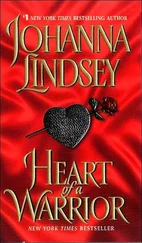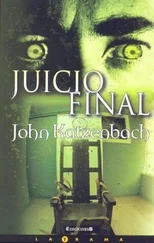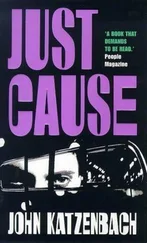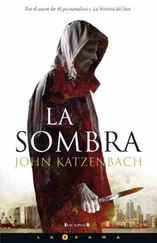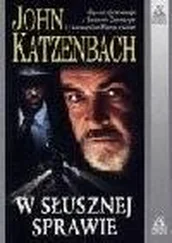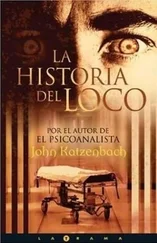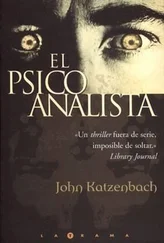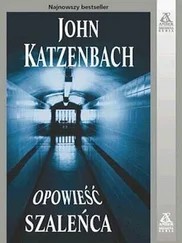John Katzenbach - Hart’s War
Здесь есть возможность читать онлайн «John Katzenbach - Hart’s War» весь текст электронной книги совершенно бесплатно (целиком полную версию без сокращений). В некоторых случаях можно слушать аудио, скачать через торрент в формате fb2 и присутствует краткое содержание. Жанр: Триллер, на английском языке. Описание произведения, (предисловие) а так же отзывы посетителей доступны на портале библиотеки ЛибКат.
- Название:Hart’s War
- Автор:
- Жанр:
- Год:неизвестен
- ISBN:нет данных
- Рейтинг книги:5 / 5. Голосов: 1
-
Избранное:Добавить в избранное
- Отзывы:
-
Ваша оценка:
- 100
- 1
- 2
- 3
- 4
- 5
Hart’s War: краткое содержание, описание и аннотация
Предлагаем к чтению аннотацию, описание, краткое содержание или предисловие (зависит от того, что написал сам автор книги «Hart’s War»). Если вы не нашли необходимую информацию о книге — напишите в комментариях, мы постараемся отыскать её.
Hart’s War — читать онлайн бесплатно полную книгу (весь текст) целиком
Ниже представлен текст книги, разбитый по страницам. Система сохранения места последней прочитанной страницы, позволяет с удобством читать онлайн бесплатно книгу «Hart’s War», без необходимости каждый раз заново искать на чём Вы остановились. Поставьте закладку, и сможете в любой момент перейти на страницу, на которой закончили чтение.
Интервал:
Закладка:
Phillip Pryce had left a will that asked Tommy to read something at the service. Tommy had spent a restless night in the Strand Hotel, frantically flipping through passage after passage of both the Old and New Testaments, unable to find words large enough to honor his friend.
Anxious, he'd risen shortly after dawn and taken a cab over to Phillip's Grosvenor Square town house, where the manservant had let him inside.
At the table beside Phillip's modest bed. Tommy had noticed an old, dog-eared, much-read, first edition of Kenneth Grahame's The Wind in the Willows. On the flyleaf Phillip had written an inscription, and Tommy had understood instantly that the book had been a gift for Phillip Junior. The message read simply: My darling boy, no matter how old and wise one struggles to become, it is always important to remember the joys of youth. Here is a book that should help you to remember in years to come. With greatest love on the wondrous occasion of your ninth birthday from your devoted father…
Tommy discovered two sections of the book that were both underlined and faded, as if worn thin by the repeated passing of a child's eyes over the words. The first was in the chapter "The Piper at the Gates of Dawn" and read: "For this is the last best gift that the kindly demigod is careful to bestow on those to whom he has revealed himself in their helping: the gift of forgetfulness. Lest the awful remembrance should remain and grow, and overshadow mirth and pleasure, and the great haunting memory should spoil all the after-lives of little animals helped out of difficulties, in order that they should be happy and light-hearted as before…"
The second of the underlined passages was almost the entirety of the final chapter, where the faithful Mole, Rat, Badger, and the irrepressible Mr. Toad arm themselves and attack the vastly superior force of weasels occupying Toad Hall, overwhelming the interlopers through their righteousness and daring.
And so, later that afternoon, disdaining the Bible and Shakespeare and Sir Thomas More and Keats, Shelley, Byron, and all the other famous poets who so frequently lend their words to solemn occasions. Tommy had risen and read to the distinguished assembly the passages from the children's book. This, he thought afterward, and Hugh Renaday had mightily agreed, was a little unexpected and more than a touch outrageous and also precisely what Phillip would have most enjoyed.
"I'm ready," Lydia said, finally emerging from the bathroom.
"You look quite exquisite," Tommy said admiringly.
"I would rather we were going to a wedding," Lydia replied, shaking her head a little bit disarmingly.
"Or a christening."
Tommy stood up and his wife straightened the tie at his neck that did not need straightening. The gift of forgetfulness, he thought. So we can all be as happy and lighthearted as before.
It was the finest of days, bright, warm. The sort of day that seems misplaced at a funeral. Shafts of vibrant summer light eagerly pierced the stained-glass windows of the cathedral, delivering odd sheets of reds, greens, and golds in wide splashes onto the gray stone floor.
The rows of pews were packed with mourners. The vice president and his wife were there, representing the administration.
They were joined by both senators from Illinois, a gaggle of congressmen, dozens of state officials, and at least one Supreme Court Justice that Tommy had once argued a case before. Eulogies were delivered by prominent men in the field of education, and there was a lengthy, excited, and almost musical reading from the Scriptures by a very young and probably slightly nervous Baptist preacher from Lincoln Scott's father's old church.
A flag draped the casket at the front of the church. In front of the casket were three enlarged photographs. On the right was a picture of Lincoln Scott as an old man, in his flowing academic robes, giving a rousing speech to university graduates.
On the left was a newspaper photo from the 1960s of Scott, arm in arm with Dr. Martin Luther King Jr. and Ralph Abernathy, leading a march down some unidentifiable southern street. But in the center, the largest picture of the three, was a young Lincoln Scott, eyes turned skyward, mounting the wing of his Mustang before flying a mission in German skies.
Tommy stared at the portrait and thought that whoever took the snapshot had probably mainly by luck managed to capture much about Lincoln Scott, just in the eagerness of his step and the ferocity in his eyes.
Tommy sat in the middle of the church, his wife at his side.
He was unable to listen to all the fine words of praise ringing out above his head from speaker after speaker who rose to the pulpit.
What he heard, instead, was the long-forgotten sound of engines howling in attack, the staccato racheting noise of machine guns mingling with the thuds of flak exploding outside, raining metal against the exterior of the bomber. For the longest of moments, he felt his throat growing dry, and sweat starting to form beneath his arms. He could hear the cries and calls of men racing into battle and the screams of men embraced by death. The noise threatened to overcome the cool interior of the cathedral where he sat. Tommy breathed out sharply, and then shook his head slightly, as if he could shake away all the memories like a dog shaking water from his fur. Three hundred miles per hour, twenty feet above the water, and the whole world shooting at you. How did you ever live? He couldn't answer his own question, but he could the one that followed: Twenty feet beneath the ground, bleeding and trapped, and no way out. How did you ever live? He took another deep breath. I lived because of the man in the casket.
At a signal from the priest, the mourners all rose and sang the first and third verses of "Onward Christian Soldiers." The strongest voices.
Tommy thought, thundered from his left, from the first two pews of the cathedral, where Lincoln Scott's extended family was gathered, surrounding a small, coffee-colored elderly black woman.
The priest at the pulpit shut his hymnal with a snap and launched into another reading from the Bible. How David fought great Goliath armed with nothing save his shepherd's sling and came away victorious.
Tommy leaned back, feeling the unforgiving wood of the bench against his bones. In a way, he thought, they were all in that cavernous room, listening to the priest. MacNamara and Clark, who'd both received medals and promotions for their command of the escape from Stalag Luft Thirteen, although Tommy had always thought that it was only that true rat-bastard Clark, who had contradicted everything Tommy had believed about him by ordering the unarmed kriegies of Hut 107 to attack the approaching Germans and buy Scott some extra time in the collapsed tunnel, who deserved the honors. Fenelli, who'd gone on to become a cardiovascular surgeon in Cleveland. Tommy had run into him once, when he was staying at a hotel that was also hosting a medical convention, and he'd spotted the onetime medic's name on a list of speakers. They'd had drinks in the lounge and some moments of alcohol-aided laughter.
Fenelli had admired the work of the Swiss surgeons who'd cut up his hand, but Tommy had told him that Phillip Pryce had threatened to shoot any doctor who dared to mess up, which, Fenelli had agreed, had probably encouraged attentiveness.
Fenelli had asked him if he'd stayed friends with Scott after the war, but Tommy had told him no, which surprised the doctor.
It was the only time he'd seen Fenelli, and he halfway hoped that when he scanned the faces of the mourners at the church he would spot the medic from Cleveland. But he did not. He'd partially expected, as well, that Fritz Number One might have flown in for the services from Stuttgart, because the former ferret owed a significant debt to Lincoln Scott.
Читать дальшеИнтервал:
Закладка:
Похожие книги на «Hart’s War»
Представляем Вашему вниманию похожие книги на «Hart’s War» списком для выбора. Мы отобрали схожую по названию и смыслу литературу в надежде предоставить читателям больше вариантов отыскать новые, интересные, ещё непрочитанные произведения.
Обсуждение, отзывы о книге «Hart’s War» и просто собственные мнения читателей. Оставьте ваши комментарии, напишите, что Вы думаете о произведении, его смысле или главных героях. Укажите что конкретно понравилось, а что нет, и почему Вы так считаете.
